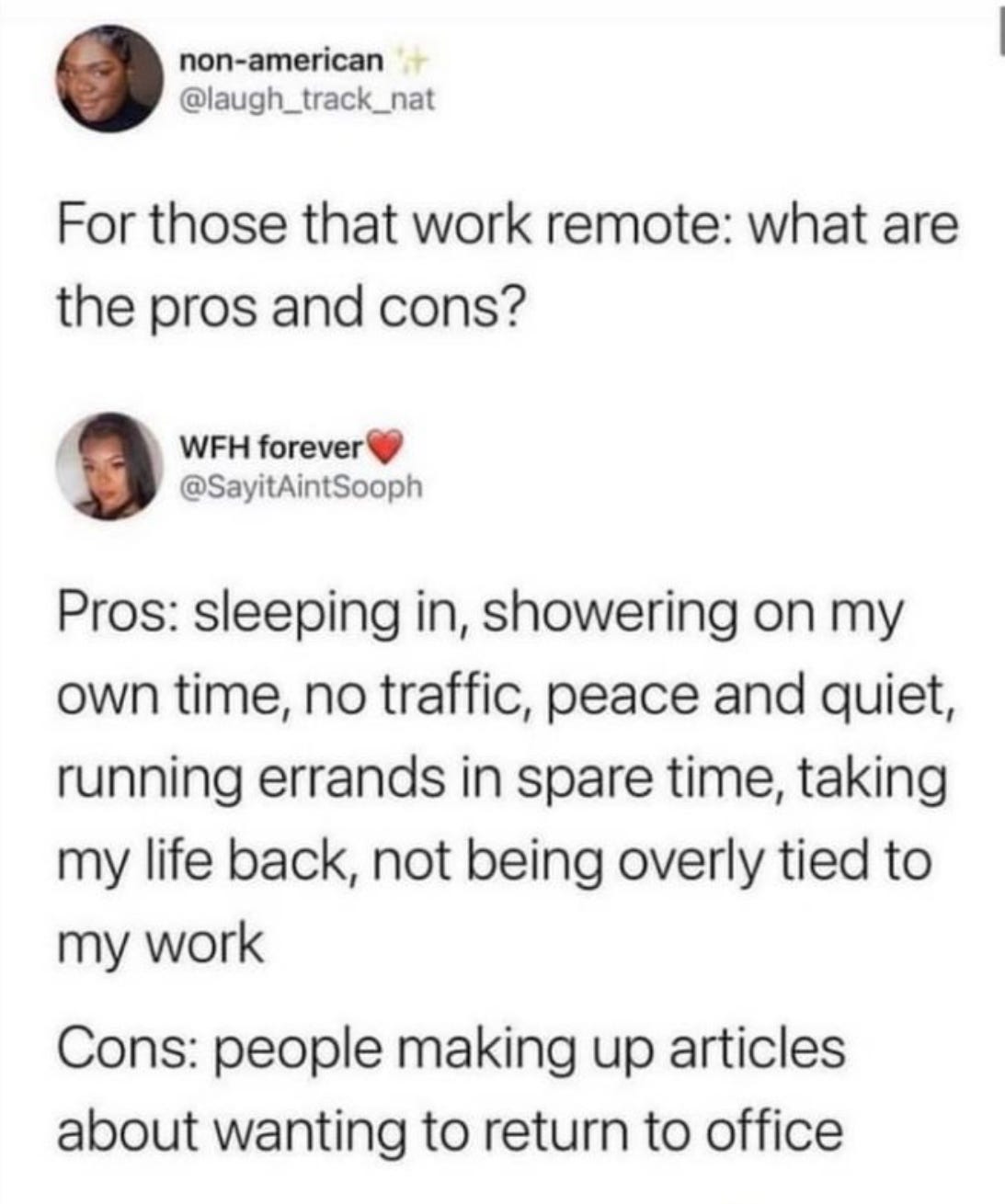Are we are never, ever, ever getting back together?
ALSO: what to do if your boss is a narcissist?
As firms dilly dally with their return to the office, for the first time what was initially just a whisper has suddenly started gaining volume: more and more companies are realising that hybrid working might not work and that they need a Plan B.
Twelve months ago suggesting that an office with only a fraction of a firm’s employees present at any point wasn’t going to work would have inevitably led to the demand that we revert to being in the office full-time, now it’s clear that that battle is lost. Remote working has proved its worth and the question is ‘will we need to go to the office regularly at all?’
Firstly let’s look at some growing evidence that the game has changed. I spoke to a handful of firms this week who each said similar things: ‘the initial forecasts of how much office space each team will be using has turned out to be way over what they imagine using now,’ one said. Companies are taking things step-by-step, allowing teams to make the call on what they see is right. And repeatedly employees are suggesting that they won’t need to be commuting as much as their bosses had initially insisted. (The confidence t is grounded in the context of the confounding situation where many firms have just clocked up record performance figures in a recession - there’s a word about those who haven’t below).
Why the change? Well those who have tried hybrid working say the long commute doesn’t seem to justify itself with the reality of long-promised workplace interactions. For sure, there’s been an initial buzz of being back in the office, of refamiliarising ourselves with the local neighbourhood, going for an after-work drink. But once that novelty has gone doing video calls and emails from the office is, erm, not as easy as doing them from home. The BBC published an article this week recognising that of all the solutions hybrid might be the worst, but it missed a critical point, workers aren’t willing to go back five days a week - because they’ve proved they can be as productive from home.
If we’re being asked to choose between the In or Out extremes of office life there’s no shortage of employees who believe the case has been proved. And if their firms disagree? Well the Great Resignation is upon us. Three of the firms I’ve spoken to this week say they’ve witnessed a big increase in the number of resignations they’re witnessing. Amongst the reasons to quit are moves to a different city that are incompatible with previous commutes, or rival employers offering total flexibility.
These things are likely to get easier from an employee’s point of view. This week the UK government announced that it intends to make remote working a right. Firms who think they can magic the world back to February 2020 are likely fighting a losing game. As Eric Schmidt, former CEO of Google once said, ‘don’t bet against the internet’.
There are some firms who have recognised that insisting that workers make the trip in for two or three days a week ‘to feel the thrill of teamwork’ are fighting a losing battle. Those who reach this realisation earlier are obviously afforded the opportunity to use it to promote themselves as progressive. It’s not necessarily that their new policies are doing anything other than listening to workers but they are certainly able to frame themselves as ahead of most leaders. Graphic design platform Canva have told workers that they will need to be with colleagues for just eight days a year.
In the context of this the firms who are trying to win PR by saying how they’re incentivising workers to return to the office look frankly potty. It’s hard not to wince when you hear one firm boasting about they’re luring workers back by offering metal water bottles, while *slow blink* another is giving out candyfloss. Zoom announced their own Zoom cubes, little veal-crate-sized spaces to enable workers to conduct video call from the middle of the office floor.
All these elements amount to the strange confidence trick that some leaders are committing, saying we need to be back in the office for culture, or to create a sense of team, or because the office is meant to feel like a farmers' market of innovative ideas. Mainly traditional bosses want workers in because they're scared and want more control of them. If it means workers are rendered in a Damian Hirst-esque glass-crate ('woman on Zoom call') then so be it. At least the managers can see them.
One old school leader got in touch with me this week, sharing this tweet:
I asked him his thoughts as regards to returning to the office, he said:
No one wants to really because it saves money, allows them to lack personal hygiene, sleep longer, and hide hangovers better. Also skivving is miles, miles easier
An interesting context is that my correspondent works in an organisation that has just had a shockingly tough year. I have no doubt the reason why remote working has been a success in so many firms is because it has been accompanied by record performance. But It seems to me that 18 months into this situation if you’re still not sure which members of your team are doing their jobs or not you need better managers - maybe his answer is work out a way to make his team accountable and to trust them more. (The idea that his workers don’t want to go to the office because it means they’ll have to shower shows such a low opinion of his team it actually requires therapy).
It’s worth saying meanwhile on Earth Two there is the beginning of a movement back to Five Days In. In banking firms are beginning to demand a return to five days a week in the office, it will be interesting how employee retention and recruiting causes any change of course from this as the world shifts.
The Five Days In office crew feel a little like that character who gets a slot on the evening news every few years who loves Christmas so much he celebrates it every day. The tragedy is for Mr-I-Wish-It-Could-Be-Christmas-Every-Day is that even if he puts the Mariah song on, dons a festive jumper, has a tot of brandy around lunchtime, no matter what he does, today isn’t Christmas. We’re not going to tempt people back to the office by telling them the office is the place where all the fun stuff happens, if it doesn’t.
The emerging question is are firms willing to get ahead of the bigger changes yet to come and recognise that a straight-down-the-middle hybrid isn’t the answer?
How to tell if your boss is a narcissist. How can we use the power of psychotherapy to help us in our jobs? A brilliant discussion with psychotherapist Naomi Shragai where we talk about how her practice has increasingly brought workplace issues to her couch.
We cover:
how imposters' syndrome might not be a disaster for your career
how to tell if your boss is a narcissist
how to deal with boss who is a people pleaser
If you're a people watcher or amateur psychologist you're going to love this. Naomi's new book is The Man Who Mistook His Job for His Life: How to Thrive at Work by Leaving Your Emotional Baggage Behind
Listen: Apple / Spotify / website


Sam Conniff, author of Be More Pirate, has teamed with scientists at University College London to hatch something new and brilliant. Uncertainty Experts is a live, synchronised viewing experience to learn how to deal with unpredictability. I’m not fully how to describe the quirkily unique format - it’s part documentary, part workshop and part online learning. What’s proved the clincher for companies like Netflix, Mercedes, Lego and more has been the fact that Conniff has researched the before and after effect of the experience and have found uplifts in risk management and wellbeing.
Sam is offering a 33% discount for Make Work Better readers for September bookings (use the code MAKEWORKBETTER). Disclosure: I make nothing from this, it just looks like a fun initiative.
I’ve seen a few things adjacent to this, Microsoft are talking about managers needing to understand their team members’ work styles
Another piece (this time in The Atlantic) saying that the current issue is with the calibre of managers that firms are currently employing
I love this story about what happened to the people who got a tattoo of taco place in return for free food for life
A few people have got in touch with me to say that lockdown has given them space to pursue their creative dreams - here advertising heavywright Tony Regan and his friend Kevin Brennan got together to record an album of Americana infused beats. Hats off to them!
PS I’m going to try to shift from Substack to Revue next week (it will be invisible, and you don’t need to do anything - I was due to do it today but Revue don’t believe my email list and won’t import half of the names).








Brilliant! Love the way how you offer different perspectives to the world of work. Hybrid is indeed not going to work in the long run as it will divide the workforce and society. Fluid (in line what Canva is doing) and letting people free to make their own choices. People who really want to be in the office will find their way and the colleagues who prefer to work from home as well.
Best,
Gerrit